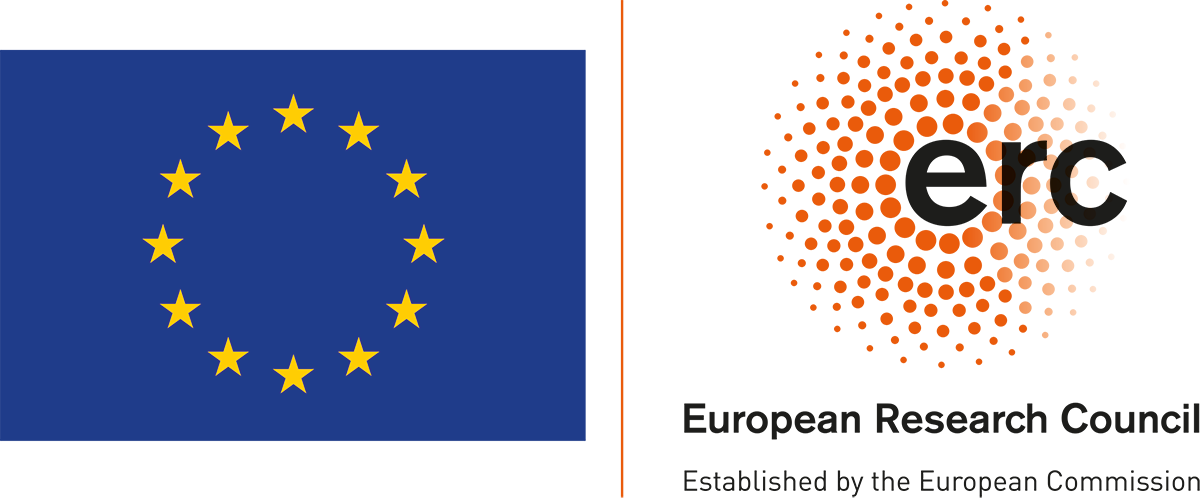Two Research Strands and Five Sub-projects
We study attention and the norms that govern it. Our research involves two strands. The Descriptive Strand studies the biological function of attention and whether natural norms for attention can be derived from it (Sub-project 1), as well as how social norms of attention may arise in groups of individuals that need to coordinate their actions (Sub-project 2). The Descriptive Strand, thus, takes a bottom-up approach to attention norms: from two different directions it investigates how attention norms might emerge.
The Evaluative Strand, on the other hand, takes a more top-down approach. It starts from three fields of philosophy that are centrally concerned with normative evaluations: the theory of practical rationality (Sub-project 3), epistemology (Sub-project 4), and ethics and political philosophy (Sub-project 5), and uses the conceptual and analytic tools in these fields (and develops new ones!) to investigate whether attention norms play a serious role in these respective areas.
Sub-project 1: Natural Attention Norms
This sub-project studies the function of attention in our cognitive architecture, and what natural norms of attention, if any, may be derived from it. It investigates the biological function of attention, both from an etiological and a systemic perspective. We are inspired by the hypothesis that the biological function of attention is to organize the input to cognitive systems by prioritizing states with the highest relevance to the individual.
In our work we argue that a core function of attention is to make agency more flexible - an ability that is essential for self-control. We also have developed a new account of the problem attention is helping an organism solve. We further investigate when attention is functioning properly: it does so, we argue, when it prioritizes processes in ways that best serve the agents needs. We apply our account of the proper function of attention to disorders like ADHD, to contemporary environments online, and to the role of attention in the evolution of cognition and agency,

Associated Researchers:
Associated Events
- Workshop "Natural Norms and the Functions of Attention"
- Hakwan Lau on “Engineering Sentience” (05/2023)
- Roberta Locatelli on Attention, Disfunction and ADHD (04/2024)
- Meeting Nicholas Allot to discuss the Cognitive Principle of Relevance (10/2022)
- Meeting Deidre Wilson and Dan Sperber to discuss Cognitive Principle of Relevance (11/2022)
Associated Presentations
-
Talk on What attention Is (Watzl)
-
Copenhagen (12/2021)
-
-
Talk on the Needs-based account of the Function of Attention (Johnson)
-
Meeting of the American Philosophical Association 2023;
-
Meeting of the Society for Philosophy and Psychology 2023
-
-
Talk on Attention and the Evolution of Abstract Thought (Johnson)
-
Annual European Congress for Analytic Philosophy 2023.
-
University of Connecticut 2023
-
Chapman University 2023
-
-
Talk on ADHD, Disfunction, and Disorders of Attention (Johnson)
-
Philosophy of Psychiatry Workshop (Bielefeld) 2024
-
Associated Publications and Work-in-Progress
- Watzl, S. (2022). Self-control, attention, and how to live without special motivational powers In M. Brent (ed.), Mental action and the conscious mind, Routledge
- Watzl, S. (2023). What attention is. The priority structure account. Wiley Interdisciplinary Reviews: Cognitive Science, 14(1), e1632.
- Friedman, Y. Watzl, S. Oftedal, G. and Gørbitz, CH (2022), Kurering, Heling, og Habilitering, Tidsskrift for Den norske legeforening, doi: 10.4045/tidsskr.21.0653
- Paper on the Natural Function of Attention (Johnson, in review process)
- Paper on the Natural Function of Attention and the Contemporary Environment (Johnson, in review process)
- Paper on ADHD and Disfunctions of Attention (Johnson, in preparation)
- Paper on Attention and the Evolution of Abstract Thought (Johnson, in preparation)
Sub-project 2: Social Attention Norms
This sub-project looks at the social dimension of attention, and the social norms that may govern it. It studies the function of attention sharing and coordination in social interaction and the emergence of social norms. It investigates the emergence of social norms of attention, if any, that guide social interactions. It considers the hypothesis that the significance of social attention norms is for negotiating relevance, and to settle common standards for relevance in a particular social setting.
In our work, we argue (based on empirical research by one of our team members) that social stereotypes are prioritized at the expense of other information that is more task relevant. We argue further that the distribution of cues in non-verbal social interactions (such as covert attention shifts) reflects and reinforces power-dynamics and social stereo-types. In ongoing work we argue that social attention and communication is further affected, we suggest, by how cognitive load reflects social biases. We have explored transgender stereotypes as a case study for these effects. We also work on applying game theoretic modelling to explain how attention becomes sensitive to specific social norms.

Associated Researchers:
Associated Events
- Workshop on Social Norms for Attention and Non-Explicit Discrimination (organized by Austin Baker, 2023)
- Bahador Bahrami from CrowdCognition (Munich) on Interpersonal Decision Making under uncertainty (2022)
- Carolyn Dicey Jennings on Social Attention (2023)
- Dan Kelly on Social and Institutional Norms for Attention (2023)
- Richard Moore on the Socialization of Attention in Hominid History (2023)
Associated Presentations
- Talk on Attention and Non-Verbal Communication (Baker)
- Meeting of European Society for Philosophy and Psychology 2023
- Minorities and Philosophy Workshop UK, 2023
- Perceiving Speaker and Voice Workshop Lillehammer 2022
- Talk on Names and Social Norms (Baker)
- Understanding Language Workshop, Moss 2022
- Talk on Communication, Attention and Cognitive Load (Baker)
- Morovian University 2024
- Workshop on Perspectives on Communication (Oslo, invited June 2024)
- Talk on Legal Right to Transgender Identity (Baker)
- Society for Philosophy and Psychology, 2023
Associated Publications and Work-in-Progress
- Austin A. Baker & J. Remy Green, 2023. “The Right to Transgender Identity,” The Cambridge Handbook of Experimental Jurisprudence, ed. Kevin Tobia, Cambridge: Cambridge University Press
- Paper on Prioritization of Social Stereotypes (Baker, revise and resubmit)
- Paper on Attention and Non-Verbal Communication (Baker, revise and resubmit)
- Paper on Social Effects of Attention to Extreme Scenarios (Baker, in preparation)
- Paper on Communication, Attention, and Cognitive Load (Baker, in preparation)
- Paper on Game Theoretic Modelling of Multi-Agent Attention (Watzl, in preparation)
Sub-project 3: Integrating Attention into Decision Theory
This sub-project investigates formal models of rational decision making that incorporate attention as an independent factor. It studies how to integrate such decision theoretic models with research on the role of attention in action. It connects with philosophical work on frame-dependent, context-dependent, and situational reasoning.
In our work, we argue that salience can play a rational role as an input to attention, whereby an agent responds rationality to what their situation demands. We develop an account of how attention interacts with belief and decision making. In work with our collaborators, we show how to formalize the role of attention in epistemic planning. We also look at the interaction of the norms of attention in agency and communicative norms.

Associated Researchers:
Associated Events
- Workshop on Attention and Mental Action (2023, organized by associated PhD student, Francesca Secco)
- Chandra Sripada on “Human Agent Architecture” (2023)
- Ruth Chang on “Attention and Choice” (2023)
- Thomas Bolander and Gaia Belardinelli on modelling attention in Dynamic Epistemic Logic (2022)
Associated Presentations
- Talk on Rationality and Salience (Watzl)
- Meeting of the German Society of Analytic Philosophy 2023
- Hebrew University and NYU 2023 (online)
- Talk on attention and rational choice (Watzl)
- Scheduled for 17.5.2024 in Stockholm
- Scheduled for 24.6.2024 in Vancouver
- Talk on Attentional Conflicts (Pedaprolu)
- Graduate Conference on Attention and Salience (Vienna), 04/2023
- Talk on Attention, agency and self-awareness (Pedaprolu)
- Second Nordic Graduate Conference on the Philosophy of Mind (2022)
Associated Publications and Work-in-Progress
- Paper on Rationality and Salience (Watzl, in review process)
- Paper on Attention and Rational Choice (Watzl, in preparation)
- Paper on Formal Models of Attention in Epistemic Planning (Watzl, with Bolander and Bellardinelli, in preparation)
- Paper on Attention and Inquisitive Structure (Pedaprolu, in preparation)
- Paper on Attentional Conflicts (Pedaprolu, in preparation)
Sub-project 4: Attention Norms and Epistemic Norms
This sub-project investigates the role of attention in epistemology and the rational status of the role of attention in the acquisition and exchange of knowledge and in inquiry. It studies the interaction between attention and epistemic norms with a special focus on a social and inquiry-centered approach to epistemic norms. It looks specifically at how epistemic notions of relevance might emerge at the interplay between, on the one hand, natural and social attention norms, and, on the other hand, the social context that make the evaluation of information exchange prominent.
Our work suggests a central role of attention in inquiry. We also explore connections (and tensions) between the epistemic role of attention and an evaluation of attention in terms of fittingness. We connect the fittingness of attention to what an agent cares about. Our work further investigates how attention impacts the legitimacy of holding some beliefs without evidence.

Associated Researchers:
- Louise Clover, Sebastian Watzl (and also Drew Johnson and Austin Baker)
Associated Events
- Workshop on Attention and Epistemology with Jessie Munton (12/2023)
- Carlos Montemayor on Attention and Epistemic Responsibility (10/2023
- Catarina Dutilh-Novaes on Attentional Networks and Epistemic Exchanges (12/2023)
- Cat Saint-Croix on Attention and Epistemology (02/2023)
- Ege Yumusak on Salience and Perspectival Conflicts (02/2023)
Associated Presentations
- Talk on Attention and Self-knowledge (Watzl)
- University of Bamberg 2022
- Talk on Fittingness and Attention (Watzl)
- Congress of the American Philosophical Association 2022
- University of Bayreuth 2023
- Talk on Fittingness, Attention, and Care (Clover)
- Scheduled for Analytic Philosophy Summer School, Inter-University Centre Dubrovnik, 06/2024
- Talk on the Epistemic Role of Attention (Watzl, with A. Lee)
- Oslo, 2022
Associated Publications and Work-in-Progress
- Paper on Belief beyond Reason (Johnson, in review process)
- Paper on Salience, Attention Norms, and Hinge Epistemology (Johnson, in preparation)
- Paper on Causal Theories of Knowledge (Baker, in review process)
- Paper on Fittingnes, Attention, and Care (Clover, in preparation)
- Paper on Inquiry and Attention (Clover, in preparation)
- Paper on Attention and Fitting anxiety (Clover, in preparation)
- Paper on The Epistemic Role of Attention (Watzl with A. Lee, in preparation)
- Paper on Attention and Self-knowledge (Watzl, invited)
Sub-project 5: Ethics: Rights and Duties for Attention
This sub-project examines moral duties of attention and political attention rights by drawing on the social role of attention norms for social coordination and joint action. Directions of research include the study of procedural duties of non-negligence as well as substantial moral duties to pay enough attention to morally relevant facts; whether there should be restrictions on the commodification of attention; and whether the normative demands of democracy put restrictions on how much of our attention an individual or group can legitimately demand.
Our work investigates how moral and political norms on attention interact with other norms on it. We explore the political legitimacy of ignoring the unreasonable, and investigate civic duties of attention. Other work studies the role of attention in democratic deliberation, how questions of justice apply to attention, and whether freedom of attention can be seen as a political liberty.

Associated Researchers:
Associated Events
- Workshop "Does Technology Destroy Our Attention?" with James Williams (03/2024
- Zacharias Irving on Good Minds in an Age of Distraction (01/2023)
- Thi Nguyen on Value Collapse and Attention (01/2023)
- Reading group and visit by Silvia Panizza on her book on The Ethics of Attention (05/2023)
Associated Presentations
- Talk on the Ethics of Attention (Watzl)
- Wisconsin Milwaukee (2.2022)
- London School of Economics (9.2022)
- University of British Columbia (Psychology) (12.2022)
- Talk on What is Wrong with Commodifying Attention (Watzl)
- Workshop on the Ethics of Attention, University of British Columbia (11.2022)
- University of Minnesota (11.2022)
- Leeds University (11.2022)
- LMU Munich (1.2023)
- Boston-Bergen Forum on Digital Futures (11.2023)
- Talk on Ignoring the Unreasonable (Kapelner)
- Workshop on Extremism and Subjectivity at VU Amsterdam (04/2024)
- Colloquium in Social and Political Philosophy at LMU Munich (04/2024)
- Talk on The Civic Duty of Attention (Kapelner)
- Workshop with Emanuela Ceva at UiT – The Arctic University of Norway (Tromsø, 10/2023)
- Workshop of the Pluralism, Democracy, and Justice Research group at UiT – The Arctic University of Norway (Tromsø 04/2024)
- Talk on Autonomy and Self-determination (Kapelner)
- Annual Meeting of American Political Science Association (accepted, in 09/2024)
- Talk on Freedom of Attention as a Political Liberty (Kapelner)
- University of British Columbia Workshop, 06/2024
- Talk on Justice and Public Attention (Kapelner – with K. Browne)
- Vienna 12.2024 (invited, scheduled)
Associated Publications and Work-in-Progress
- Watzl, S. (2022). The ethics of attention, In: Sophie Archer (ed.), Salience, Routledge
- Paper on The Ethics of Commodifying Attention (Watzl, with K. Browne)
- Paper on Ignoring the Unreasonable (Kapelner, in preparation)
- Paper “The Civic Duty of Attention” (Kapelner, in preparation)
- Paper on Justice and Public Attention (Kapelner with K. Browne, in preparation)
- Paper “Democracy and the value of political choice” (Kapelner, in preparation)

GOODATTENTION: Attention norms and their role in practical reason, epistemology, and ethics - is funded by the European Union's Horizon 2020 research and innovation programme under grant agreement no. 101003208 (ERC Consolidator Grant 2020).
